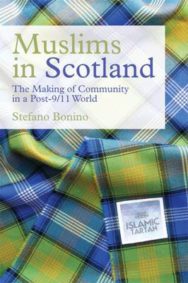
ABOUT THIS BOOK
PUBLISHER: Edinburgh University Press
FORMAT: Hardback
ISBN: 9781474408011
RRP: £80.00
PAGES: 224
PUBLICATION DATE:
November 30, 2016
BUY THIS BOOK
As an Amazon Associate and Bookshop.org affiliate we earn from qualifying purchases.
Muslims in Scotland: The Making of Community in a Post-9/11 World
Stefano Bonino
The experience of being a Muslim in Scotland today is shaped by the global and national post-9/11 shift in public attitudes towards Muslims, and is infused by the particular social, cultural and political Scottish ways of dealing with minorities, diversity and integration. This book explores the settlement and development of Muslim communities in Scotland, highlighting the ongoing changes in their structure and the move towards a Scottish experience of being Muslim. This experience combines a sense of civic and social belonging to Scotland with a strong religious and ideological commitment to Islam.
Reviews of Muslims in Scotland: The Making of Community in a Post-9/11 World
'This up-to-date analysis rests on a historical and demographic foundation. Its account of the Muslims of Scotland and their experiences, often so different from the rest of the UK, is a welcome addition to the literature on Muslims in Europe.' — Professor Jorgen S. Nielsen, University of Birmingham 'This is an important, fresh and pioneering study of the Muslim community in Scotland. It should be required reading for policy makers and academics as well as all those interested in the changing social shape of Scotland today.' — Professor Sir Tom Devine, University of Edinburgh 'Muslims in Scotland highlights the distinctive features of both Scottish identity and Scotland's Muslim communities, demonstrating the relatively benign relationship between the two, in contrast to the situation in some other parts of the UK and Europe.' — Professor Hugh Goddard, University of Edinburgh "
Stefano Bonino
Stefano Bonino is an Italian-born British academic, Lecturer in the Department of Social Sciences at Northumbria University and Fellow of the Royal Society of Arts. He previously held a postdoctoral position at the University of Durham and was educated at the Universities of Edinburgh and Turin. He has published academic articles on various aspects of Muslim life in Great Britain in Contemporary Islam (2016), Scottish Affairs (2015), Patterns of Prejudice (2015) and Journal of Muslim Minority Affairs (2012 and 2013).











